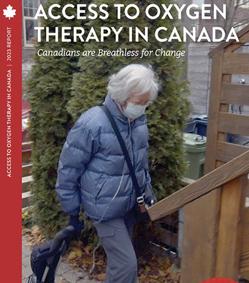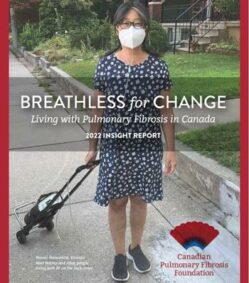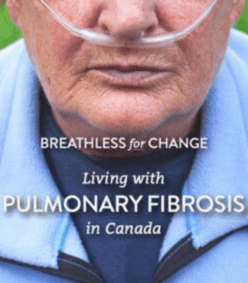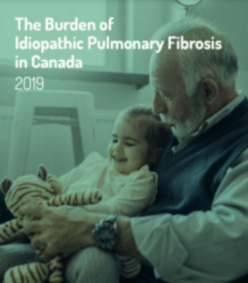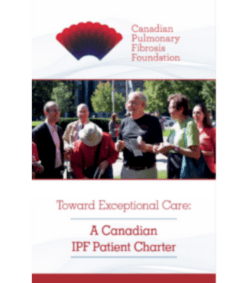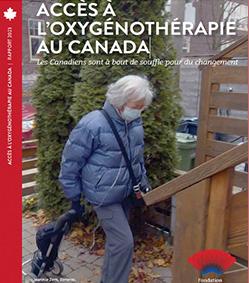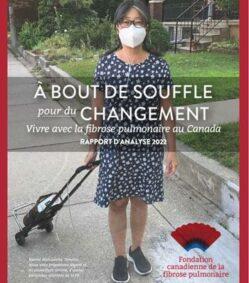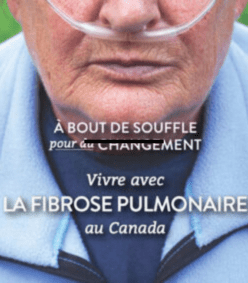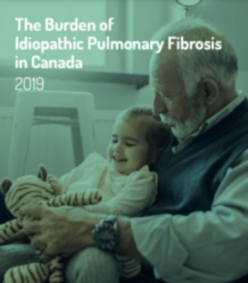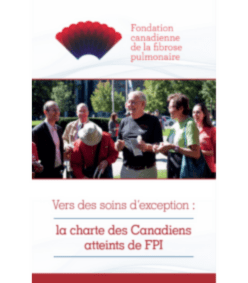Advocacy

We are the voice for Canadians living with pulmonary fibrosis
The Canadian Pulmonary Fibrosis Foundation (CPFF) is a resource for all patients and families affected by pulmonary fibrosis. We work with government and healthcare professionals to bring about better access to care, treatment, and support to improve the lives of people living with pulmonary fibrosis and their care partners.
CPFF aims to raise public and government awareness of the disease, and the issues facing our community, and affect positive funding and policy changes.
Earlier Diagnosis

More Equitable Treatment
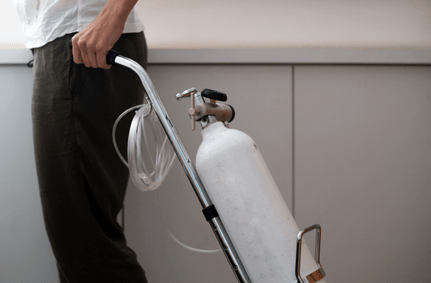
Patient & Caregiver Support

Empower Self Advocacy

Advocacy Campaigns for 2021-2024
We focused on expanding access to the anti-fibrotic medication nintedanib (Ofev) beyond treatment for idiopathic pulmonary fibrosis (IPF) to include people with progressive fibrosing interstitial lung disease (PF-ILD). As of August 2022, nintedanib (Ofev) is included in the drug formulary list and reimbursement is provided to people with any progressive fibrosing interstitial lung disease (PF-ILD) including connective tissue diseases, in all of the provinces and territories, except Nunavut.


Oxygen is unacceptably scarce. We’ve been working to help all Canadians living with pulmonary fibrosis get quicker, more equitable access to oxygen therapy. This means that patients would get an oxygen therapy prescription when needed and have this prescription filled promptly. See CPFF Oxygen Access Reports.
We maintain ongoing relationships with patients, caregivers, elected officials and public servants, healthcare professionals, researchers, health industry representatives and related charities to work together to provide solutions to issues facing the PF Community.
Our approach is collaborative. We research and provide elected officials and policymakers with solutions that work best for people living with PF, as well as improve the healthcare systems we all use. It is important to recognize that advocacy is a process and it can take a long time to accomplish goals. Since there is strength in numbers, grassroots advocacy is just as important. We look to our community to help spread these important messages to government representatives across the country.
How CPFF Advocates
- Ongoing meetings between PF patients, CPFF representatives, and health care professionals with elected officials and public servants
- Targeted email campaigns using digital tools and involving members of the PF Community
- Submissions and presentations to government committees and agencies
- Media, social media engagement and public awareness components to gain support.
- Joint research and work with related health charities to strengthen campaigns with a shared policy change goal.
- Maintaining contacts with patients, caregivers, elected officials and public servants, healthcare professionals, researchers, health industry representatives and related charities.
CPFF representatives connect with governments at all levels to advocate for Canadians living with pulmonary fibrosis. The following are an update on our recent advocacy work and some of our most recent touchpoints and successes with government departments, ministries and individuals across Canada.
2024 March
CPFF Executive Director Sharon Lee met with Catherine Fife, MPP and a member of the Ontario Finance Committee to share CPFF’s recommendations for improving access to oxygen. MPP Fife offered to communicate her support of CPFF’s recommendations to the ministers of finance and health.
2024 February
Rare Disease Day in Ottawa
CPFF Executive Director Sharon Lee attended the Canadian Organization for Rare Disorders’ (CORD) Rare Disease Day Summit and Advocacy Day in Ottawa on February 28 and 29.
Ms. Lee met with several parliamentarians to urge them to take action on Canada’s drugs for rare disease strategy, which was announced last year and is intended to provide a pathway for coverage of rare disease drugs.
Monitoring Ontario’s budget
CPFF continues to reach out to Ontario MPPs to negotiate with the federal government for funding through the rare disease strategy.
Following our presentations to the provincial government last December and this January, we are also monitoring progress in Ontario’s 2024-2025 budget development, to see if they will respond to our requests.
2024 January
CPFF’s Executive Director Sharon Lee was invited to appear before the Ontario Ministry of Finance during the ministry’s consultations in advance of the 2024 provincial budget on January 29, 2024. Sharon reiterated CPFF’s recommendations concerning access to oxygen. CPFF has arranged follow-up meetings with MPPs to further advance these recommendations. Click here to read CPFF’s recommendations to the Ontario Ministry of Finance for the 2024 Ontario budget.
2023 December
CPFF’s Executive Director Sharon Lee appeared before Ontario’s Standing Committee on Finance and Economic Affairs on December 11, 2023 to illustrate the challenges faced by Ontarians living with pulmonary fibrosis and to provide CPFF’s recommendations to improve access to oxygen therapy. Some committee members even took up the Pucker Up Challenge and learned how difficult breathing can be for people who require supplemental oxygen. Click here to read CPFF’s recommendations to Ontario’s Standing Committee for the 2024 Ontario budget.
2023 September
CPFF responds to survey on appropriate medicines in Canada
The CPFF completed and submitted its response to the 2023 Interim Report, Addressing Appropriate Use of Prescription Medicines in Canada.
Appropriate use of medicines refers to taking the right medicines at the right time and with the right information provided by prescribers and drug manufacturers. For people with pulmonary fibrosis (PF), this is an important element of treating and managing this rare disease.
You can read the report and our response below
2023 Interim Report, Addressing Appropriate Use of Prescription Medicines in Canada
2023 July
Patented Medicine Prices Review Board (PMPRB) Guidelines
As of July 2023, the PMPRB is holding consultations encouraging stakeholders and interested members of the public to provide their input on new proposed Interim Guidance. This new proposed guidance would amend the existing Interim Guidance which was issued by the Board on August 18, 2022, and was intended to be a temporary measure following Health Canada’s July 2022 amendments to the Patented Medicines Regulations. The new guidance would allow Board staff to address new medicines under the new Regulations until a final set of Guidelines is in place.
Pre-Budget Submissions
CPFF recently submitted its recommendations to the federal government as it prepares the 2024 federal budget.
CPFF’s pre-budget submission made two recommendations: (1) Improve the lives of PF patients with dedicated provincial funding for health care navigator services and (2) Improve access to support for people with PF in rural, remote, and Indigenous communities.
Read CPFF’s full submission here.
Quebec Rare Disease Plan 2023-2027
The Government of Quebec released a four-year action plan around its rare disease policy. In total, $17.2M has been allocated to the plan in the provincial budget, and is focused on three areas, including awareness of, and training around rare diseases; easy and equitable access to diagnosis; and promoting research, innovation and data collection.
In response to the plan, CPFF wrote to the ministry to offer our support by providing educational materials and resources for people living with PF, recommending subject matter experts including members of the CPFF Medical Advisory Board (MAB), and promoting Quebec’s rare disease plan to members of the PF community, including people living with the disease, their caregivers and health professionals.
You can read CPFF’s letter to the Government of Quebec here (English / Français).
Provincial Elections
The next provincial elections will be the Northwest Territories and in Manitoba in October 2023.
CPFF’s advocacy will be focused on educating candidates from the main political parties of the issues facing people living with PF, including access to oxygen and navigating the provincial and territorial healthcare systems.
CPFF Meeting with Health Canada’s Director General for the Drugs for Rare Diseases Strategy
On July 28, CPFF’s Executive Director Sharon Lee met with Daniel MacDonald, who is the Director General of the Drugs for Rare Diseases directorate at Health Canada where he is principally responsible for leading the implementation of the recently announced National Strategy for Drugs for Rare Diseases.
The meeting was focused on providing an overview of CPFF’s work to support Canadians living with pulmonary fibrosis, as well as of the challenges they face in accessing the care they need. The Director General welcomed any information the CPFF could share on this, including the recent Breathless for Change report.
CPFF Letter to Alberta’s Health Minister Regarding Oxygen and Rare Diseases
The CPFF recently wrote to Adriana LaGrange to congratulate her on being named Alberta’s new health minister and to provide more information on CPFF’s position access to oxygen and the federal rare disease strategy. In response, Minister LaGrange indicated that the Alberta Aids to Daily Living Program is currently reviewing its policies for exertional oxygen and that it is currently working with the federal government on rare diseases. Both letters can be found here.
2023 January
Patented Medicine Prices Review Board (PMPRB) Guidelines
The proposed new guidelines for the PMPRB were not implemented on January 1, 2023, as originally planned. The current guidelines will remain in place until further notice. Health Canada asked PMPRB to consider pausing the consultation process, reasoning that “[a] pause will allow time to work collaboratively, with all stakeholders and health system partners, to understand fully the short and long-term impacts of the proposed new Guidelines.” CPFF’s submission to the PMPRB to communicate our concerns as they relate to PF patients can be found here.
Government funding for French translation
As a national organization, it is important that CPFF’s materials are provided in both official languages. To that end, CPFF will be applying for government funding for French translation of various materials, including the patient guide, other downloadable resources, web pages, etc.
Upcoming provincial elections
In advance of the Alberta provincial election this spring, representatives of CPFF participated in a webinar hosted by the Health Coalition of Alberta on December 15, 2022 to learn more about the healthcare issues in the province and their relevance to PF patients there. CPFF is seeking to engage with similar health coalitions across the country to monitor provincial-specific issues facing PF patients.
Other provincial elections in 2023:
- Prince Edward Island – October 2, 2023
- Manitoba – October 3, 3023
Webinars To better understand the global issues and new developments in the field of medicine use and market growth, CPFF will be attending the IQVIA Institute’s “The Global Use of Medicines 2023” webinar on January 24, 2023.
2021 February
Late last month, the Canadian Agency for Drugs and Technologies in Health (CADTH) and the Quebec équivalent L’Institut national d’excellence en santé et en service sociaux (INESSS) recommended that nintedanib (Ofev) be reimbursed for the treatment of chronic pulmonary fibrosing interstitial lung diseases with a progressive phenotype under certain conditions. You can read the CADTH summary report here and the INESSS report here.
2021 September
During Pulmonary Fibrosis Awareness Month, several municipal, provincial and federal government officials supported our Community through proclamations of the Month or sending greetings through www.hopebreatheshere.com, our campaign microsite. You can read or watch the actual announcements on the Stories section of that website.
Proclamations came from:
Charlie Clark, Mayor of Saskatoon
Frank Scarpitti, Mayor of Markham, Ontario
Tyler Shandro, Q.C., Alberta Minister of Health
Video greetings were received from:
Peter Bevan-Baker, Leader of the PEI Green Party
Christine Elliott, Ontario Minister of Health
John Horgan, Premier of British Columbia
Wab Kinew, Leader of the Manitoba NDP
Ryan Meili, Leader of the Saskatchewan NDP
Scott Moe, Premier of Saskatchewan
Naheed Nenshi, Mayor of Calgary
2020 August
CPFF made a patient organization submission to CADTH to advocate for access to nintedanib (Ofev) beyond people with IPF.
2020 January
Met with Tara Wilson, Caroline Proctor and Heather MacDermid of the Provincial Programs Branch, Priority & Acute Care Unit, Ontario Ministry of Health, to discuss the CPFF proposal for funding for ILD Nurses in clinics in Ontario. Follow-up email with Marisha Warrington of the same office later in January.
2019 December
On December 4, 2019, CPFF held a lobby day at Queen’s Park in Toronto, Ontario, followed by an information reception for MPPs. Four of the MPPs attending, one from each political party, spoke in support of CPFF and it’s request for ILD nurses in five Ontario ILD clinics. (Read more about this request in our December 2019 newsletter Hope Breathes Here.)
CPFF representatives also met earlier in the day with Mike Heenan, Assistant Deputy Minister in the Ministry of Health and Kristin Taylor as well as Christine Hogarth, MPP for Etobicoke-Lakeshore. Subsequent meetings in January 2020 have already been planned with Ministry staff to advise CPFF on the requirements for a successful proposal. Additional meetings have also been scheduled in January with MPPs who were unable to attend the reception or meet with us on December 4.
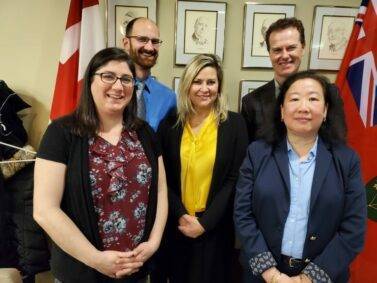
The following are a list of MPPs who attended the afternoon reception on December 4. The first four listed also addressed the gathering.
- Mike Schreiner, Leader of the Green Party of Ontario and MPP for Guelph
- John Fraser, Interim Leader of the Ontario Liberal Party and MPP for Ottawa South
- Jill Andrew, MPP for Toronto-St. Paul’s (she is a member of the NDP)
- Robin Martin, Parliamentary Assistant to the Minister of Health, and MPP for Eglinton-Lawrence
- Teresa Armstrong, MPP for London-Fanshawe
- Gilles Bisson, MPP for Timmins
- Guy Bourgouin, MPP for Mushkegowuk-James Bay
- Steve Clark, MPP for Leeds-Grenville-Thousand Islands and Rideau Lakes (and Minister of Municipal Affairs and Housing)
- Catherine Fife, MPP For Waterloo
- Faisal Hassan, MPP for York South-Weston
- Andrea Khanjin, MPP for Barrie-Innisfil
- Sol Mamakwa, MPP for Kiiwetinoong
- Billy Pang, MPP for Markham-Unionville
- Sheref Sabawy, MPP for Mississauga-Erin Mills
- John Vanthof, MPP for Timiskaming-Cochrane
- John Yakabuski, MPP for Renfrew-Nipissing-Pembroke (and Minister of Natural Resources and Forestry)
The following are a list of MPPs who sent staff (in some cases more than one person) to attend the CPFF reception on their behalf:
- Lisa Gretzky, MPP for Windsor West
- Christine Hogarth, MPP for Etobicoke-Lakeshore
- Andrea Horwath, Leader of the New Democratic Party of Ontario and MPP for Hamilton Centre
- Logan Kanapathi, MPP for Markham-Thornhill
- Vincent Ke, MPP for Don Valley North
- Laura Mae Lindo, MPP for Kitchener Centre
- Michael Mantha, MPP for Algoma-Manitoulin
- Rick Nicholls, MPP for Chatham-Kent – Leamington
- Kaleed Rasheed, MPP for Mississauga East-Cooksville
- Peggy Sattler, MPP for London West
- Sara Singh, MPP for Brampton Centre
- Todd Smith, MPP for Bay of Quinte (and Minister of Children, Community and Social Services)
- Vijay Thanigasalam, MPP for Scarborough-Rouge Park
- Michael Tibvollo, MPP for Vaughan-Woodbridge (and Associate Minister of Mental Health and Addictions)
- One staff person from the Office of the Premier
Our February 2020 issue of the CPFF newsletter Hope Breathes Here will bring you the latest updates on our progress with this request of the Ontario government. The newsletter will be sent out by email and posted our website on February 5, 2020. (There is no issue in January.) To receive our newsletter, free of charge, click here.
2019 September
During Pulmonary Fibrosis Month in September 2019, several government representatives attended or participated in a variety of events to help increase public awareness of pulmonary fibrosis. The following are some of those people and events:
Burnaby Mayor Mike Hurley presented Sharon Lee, CPFF Executive Director, with a Proclamation from the City for Pulmonary Fibrosis Month.
Calgary Mayor Naheed Nenshi attended the Clarke Family Walk for Pulmonary Fibrosis in Calgary.
Members of Calgary City Council, including Mayor Naheed Nenshi, blew bubbles in support of people living with pulmonary fibrosis.
MLA David Shepherd and MP Ziad Aboultaif attended a patient education event in Edmonton.
Markham Mayor Frank Scarpitti holds up the Markham Proclamation with CPFF representative Heather Davidson.
The Honourable Antoinette Perry, Lieutenant Governor of Prince Edward Island helped raise a flag in recognition of Pulmonary Fibrosis Awareness Month with local residents Winston Younker, Doug Archbell and Mike MacLean. The flag was raised on August 30, 2019 for September.
PEI Minister of Health James Aylward addressed the audience at the Pulmonary Fibrosis Forum in PEI. MLAs Cory Deagle and Michele Beaton also attended the Forum.
In Newfoundland, St. John’s and Mount Pearl City Councils proclaimed September as Pulmonary Fibrosis Awareness Month.
2019 February and March
Earlier in 2019, CPFF Executive Director Sharon Lee met with the following people:
March 20, MPP Doug Downey, Parliamentary Assistant, Ministry of Finance.
March 16, MP Frank Baylis at a fund development event held in Montreal.
March 14, Charles Lamman, Director of Policy and Laurel Brazill, Director of Stakeholder Relations, from the office of the Ontario Minister of Health.
March 6, MPP Stephen Crawford, member of the Ontario Finance committee.
March 6, MPP John Fraser, Ontario Interim Liberal Leader.
March 1, MPP Stan Cho, member of the Ontario Finance committee.
February 1, Kailey Vokes from the office of the Ontario Minister of Finance.
Every member of the pulmonary fibrosis (PF) community can make a difference. An organized group of individuals can have a profound impact on promoting public awareness and education about the disease. It can also support policy and legislation that may have a positive impact on access to healthcare or increase research funding to find a cure.
As a person living with PF, you are the expert in your personal health and the best spokesperson to address issues based on first-hand experience. Tell people how PF impacts your life and become an advocate for yourself and for the pulmonary fibrosis community. Check back here to learn how you can take action and make a difference. Sign up for our newsletter to stay current on advocacy news.
8 tips for Self – Advocacy
Being your own health advocate is one of the most important things you can do to receive the best care available. To some of you, self-advocacy may be scary and/or uncomfortable. Whether that is the case or not, here are some tips that can help you advocate for better care.
Do Your Research
Knowledge is power. Ideally, you should be walking into your doctor’s office as prepared as you can be.
If you haven’t already, you should familiarize yourself with the disease you are dealing with. The CPFF website is a great resource for that. If you look for information elsewhere, be mindful that there is a lot of misinformation out there.
Another thing you should familiarize yourself with is the financial support you can receive. Each province has their own policies concerning the reimbursement of PF treatments and oxygen therapy. If you are Indigenous or a Veteran, there are federal programs that may apply to you as well. If you have a private insurance, find out what they cover, as some of the government policies have limitations in their coverage.
If your condition is limiting your ability to do your own research, don’t be afraid to reach out to your caregiver, a friend or a family member to help you do so.
There is not enough time during a doctor’s appointment to get a full picture of what you are dealing with if you’re unprepared, and that’s why it pays to do your homework. That being said, this brings us the next point…
Prepare Questions for Your Visit
There’s probably some, or many, questions that popped to your mind as you were researching. Perhaps there’s some information that wasn’t clear, or you simply want to confirm something what you read or heard. Maybe you simply weren’t able to find a satisfying answer to one of your concerns.
Regardless of how the question came to mind, write them all down (or have someone write them down for you) and bring them to your next appointment.
And remember, there are no stupid questions. As Carl Sagan once said, “There are naïve questions, tedious questions, ill-phrased questions, questions put after inadequate self-criticism. But every question is a cry to understand the world. There is no such thing as a dumb question”.
Get to Your Appointment Early and Bring Someone with You
If at all possible, arrive early to ensure you’re calm and composed when the time comes to talk to your doctor. This can help you center yourself so you feel comfortable and confident bringing up questions and concerns as they come along.
Additionally, bringing someone close to you, whether a caregiver, a friend or a family member, can be great for moral support.
However, not everyone is fortunate to have someone in their lives who can help out. If that’s the case, try finding a patient advocate that can accompany you. They are trained professionals, or volunteers, who come along to appointments and help to ensure you get the quality healthcare that you deserve.
Clearly Communicate What You are Experiencing
Whether you are experiencing new or worsening symptoms, or side-effects to your medication, it is important that you give your doctor as many details as possible.
What are they? Where- and how long have you been experiencing them?
If you’re at all concerned about something, anything, don’t be afraid to bring it up. Your doctor is there to help you. Remember that you’re the expert about your own experiences, and confidently share anything you’ve found notable.
Take Notes (and Ask For a Copy of Theirs)
Taking notes during every appointment has many benefits. It can help you:
- Keep track of what has been discussed.
- Do research later.
- Get a second opinion.
If your condition limits your ability to take notes, don’t be afraid to ask whomever accompanied you to help you do so.
You can also try asking the doctor to write down any relevant notes for you so you can have a copy. This includes next steps or copies of any test or scan results.
Be Assertive, Confident and Persistent
You may disagree with something your doctor is saying. You may have a question that still hasn’t been answered. You may have a concern that still hasn’t been addressed.
Whichever it is, remember that your doctor is there for you. Should you feel concerned about anything, speak up. Reiterate your concern or question. Do so in a clear, calm and firm manner until it is addressed. It may be uncomfortable, but it is necessary.
You may have all the right questions, but sometimes, unless you’re assertive, confident and persistent, you may not get all the answers.
Confirm the Next Steps with Your Doctor
Ideally, at the end of every appointment you should take a moment to summarize what you have learned and what you understand the next steps to be. This simple exercise will allow you to confirm and you and your doctor are on the same page.
If anything was misunderstood, this is the moment where it gets clarified. You’d be surprised how often that happens.
Get Emotional Support/Call for Backup
Last but not least, while you are living your life, in between appointments, it is important to have a support network. Beyond your caregiver and your doctor, meeting with a support group and/or consulting a mental health professionals can go a long way in keeping you mentally and emotionally fit.
Advocacy FAQs
What is Advocacy?
- A verbal support or argument for a cause or policy
- Raising awareness or educating people about your issues
- Telling your story to someone with the purpose of making a difference
- A process which takes time to gain tangible results
- Reasonable and grounded in sound, rational thought
- Empowers others to take some form of action
- Personal, to your own style and comfort level
What are the Types of Advocacy?
Individual advocacy
Asking questions, staying informed about your condition and the various treatment options available to you. Being empowered to ask for what you need.
Issue-based advocacy
Educating and influencing those who make public healthcare policy decisions in order to enact positive change to the systems that provide patient treatment or services.
How Can I be an Advocate?
- Educate yourself about PF
- Join or start a CPFF support group
- Volunteer with CPFF
- Connect with your community and your elected representatives
- Respect others’ privacy and confidentiality
- Create an environment to empower those around you
- Be yourself. Your authenticity will shine through and have the greatest impact on others.



